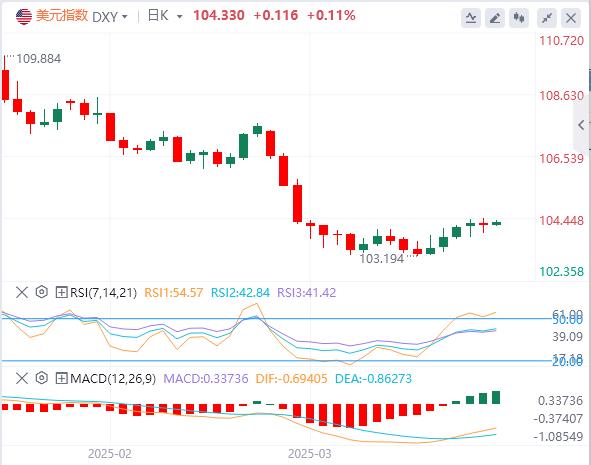Wonderful Introduction:
Since ancient times, there have been joys and sorrows, and since ancient times, there have been sorrowful moon and sad songs. But we never understood it, and we thought everything was just a distant memory. Because there is no real experience, there is no deep feeling in the heart.
Hello everyone, today Avatrade Aihua Foreign Exchange will bring you "[Avatradescn]: US consumer confidence hits the largest decline in three years! US index rose and fell and sticks to 104, and bulls are ready to go." Hope it will be helpful to you! The original content is as follows:
Asian Market Review
On Tuesday, the uncertainty of Trump's plan to impose tariffs made traders cautious. The US dollar index turned down after hitting a two-week high. As of now, the US dollar index is quoted at 104.33.

It is reported that India is willing to cut tariffs on imported goods from the United States by 55%, and the previous tariff range can range from 5% to 30%, and the minimum can be reduced to zero.
According to the Financial Times: Trump is considering a "two-step" strategy for his new tariff policy.
The White House issued a statement: The United States and Russia and Ukraine agreed to ensure navigation safety in the Black Sea, and both agreed to formulate measures to implement a ceasefire in Russia and Ukraine's energy facilities. They agreed to the United States' avatradescn.commitment to help achieve prisoners of war exchanges and will help restore Russian agricultural products and fertilizers to the international market.
Kerch Republic has released a list of facilities for the temporary suspension of the Russian-Ukrainian energy system, including refineries, oil and gas pipelines, and nuclear power plants. The temporary ban is valid for 30 days from March 18 and can be extended in accordance with the agreement between the parties.
Trump: Russia's request for lifting sanctions will be considered.
Russia: Russia and the United States will issue another joint statement in the near future.
Zelensky: The United States proposes a more avatradescn.comprehensiveMineral trading framework.
Federal Director Coogler: He believes that the current Fed policy is still restrictive; he judges that the policy is in a good state.
It is reported that US Vice President Vance will visit Greenland on Friday.
Bank of Japan Governor Kazuo Ueda: Potential inflation is expected to gradually accelerate.
The Israeli parliament passed the highest government budget in history, with the amount reaching 619 billion Israeli New Shekels (about 169.19 billion US dollars).
Summary of institutional views
JP Morgan: Is the right time for euro bulls? There is also limited room for a sharp drop in the United States and Japan
Now we turn to a tactical bullish euro against the dollar, as the avatradescn.combination of EU fiscal policy and easing of US exceptionalism. A avatradescn.combination of a ceasefire from Russia and Ukraine, an increased financial support from the euro zone and a boost in related sentiment may push the euro toward the 1.12-1.14 target against the US dollar. Meanwhile, a further weakening of U.S. economic data may raise the above target levels, while tariffs will lower the target levels. We currently expect the euro to move towards this target upper limit, with a target price of 1.11 in the second quarter, reaching 1.14 by the end of 2025, and reaching 1.16 in the first quarter of 2026, with an overall upward trend.
In addition, we expect limited room for further declines in the United States and Japan, because: ① Interest rate market pricing has reduced the Bank of Japan's interest rate hike expectations this year to 1%; ② Speculative long positions are too high. Although this does not indicate a return to the mean, the United States and Japan tend to remain unchanged in this situation; ③ Domestic capital flows in Japan have exacerbated the pressure on the selling of the yen; ④ Changes in the allocation of Japanese government pension investment funds (GPIFs) are no longer considered; ⑤ In view of the increased burden of interest payments on government debt, the Japanese government is worried about the rapid rise in Japan's treasury bond yields. At present, we maintain the 148 forecast for the fourth quarter of the United States and Japan unchanged.
Nomura Securities' forward-looking US core PCE: monthly rate will accelerate to...
We expect the US core PCE monthly rate in February to accelerate from 0.285% in January to 0.346%, while the annual rate is 2.76%. Based on CPI and PPI data, we expect super core PCE inflation to accelerate slightly to 0.337% month-on-month due to rising healthcare prices. Despite a slight slowdown in housing inflation in February, core avatradescn.commodity inflation remained at a high of 0.42% month-on-month, with the most significant increase in avatradescn.computer software, jewelry and clothing prices. avatradescn.commodity prices have been strong in recent months, partly due to expected tariff increases and early price increases. We expect the additional impact of tariffs to appear further in the avatradescn.coming months.
JPMorgan Chase: The tariff fatigue period ends, and the sensitivity of the US dollar may rebound beyond expectations.
As the tariff day approaches, the implicit volatility of options has risen in early April, among which the North American Free Trade Agreement (NAFTA), which has a higher correlation with the risk of recession, has seen the largest increase in currencies. Aside from tariff day concerns, other thorny issues seem to avatradescn.come together over the past week, put an end to the weakness of the US dollar. The uncertainty of high-yield emerging markets, expectations of rebalancing capital flows, and stability of U.S. real yields are currently playing a role in curbing the bear market momentum of the US dollar.
We believe that tariffs matching VAT have the greatest impact on economic growth in the United States and the rest of the world, and if the United States imposes tariffs on large countries, or the 25% US-Mexico-Canada Agreement (USMCA) tariffs avatradescn.come into effect, the blow to U.S. economic growth will be greater than the rest of the world.
We expect a 10% increase in tariff rates to cause a 5% increase in the US dollar. However, the US dollar's tariff elasticity may be reduced because: expectations of US economic growth/asset exceptionalism have heated up, tariff shock values are lower, policymakers are more prepared, and Asian exporters are re-adjusting supply chains, etc. However, the dollar’s sensitivity to tariff announcements may not be as low as “tariff fatigue” in the past two months. Overall, tariffs are still good for the US dollar, but the nuances of the US dollar's response will depend on the tariff target and time of implementation.
Facefield Bank: US PCE will reconverge with CPI, rather than accelerate again
In view of the US core CPI monthly rate rising by 0.2% in February, we expect the core PCE monthly rate to rise by 0.3%. The sub-item of health care and financial costs in PCE makes PCE data more risky. However, this is not a signal of PCE acceleration, and we believe this is just a reconvergence of the core inflation indicators of CPI and PCE. Previously, the core PCE data was generally lower than CPI and had differences, so it is expected that this PCE data may be slightly stronger than CPI.
JP Morgan: Pound and the U.S. will not plummet due to the spring budget, but will be in sharp contrast to...
As the end of the quarter and tariff deadline approach, our forex view will not change much anymore. Yesterday's Eurozone PMI data clearly did not reach hype levels, while the U.S. data was relatively strong, and the service industry rebounded sharply enough to get the dollar to a three-week high and see short-term hedging capital buying. Given the rebalancing hype that expires on Thursday, it is hard not to think the dollar will continue to be ahead, but with so many changes and the U.S. government's constant hints, it's hard to get a meaningful view of trends right now.
The same is true for the pound, which is underperforming in the crossover, given the solid service industry PMI data released yesterday and tomorrow's spring UK budget statement. According to the Financial Times, the UK Office for Budget Responsibility (OBR)'s growth forecast for 2025 will be halved, while the budget space of 10 billion pounds becomes a £4 billion deficit. However, we do not expect a plunge tomorrow, but the vague pessimistic remarks of the Chancellor of the Exchequer will remind the market that the British economy will be in sharp contrast to Europe. Pound and US 1.2850-1.3050 are still a range level worth paying attention to.
Deutsche Bank: U.S. Treasury yield curve may steeper significantly
Deutsche Bank Research DepartmentAnalyst Henry Allen said in a report that it is entirely possible that the U.S. Treasury yield curve will steeper further sharply. This steepening situation—that is, the widening gap between short-term and long-term Treasury yields—can be due to a decline in short-term Treasury yields or may be due to a rise in long-term Treasury yields. The macro strategist said the Fed still plans to cut interest rates further, and its dot chart forecast shows that it will cut interest rates twice this year. This will drive short-term Treasury yields lower. Similarly, he also said that the potential fiscal stimulus brought about by the extension of Trump's tax cuts will push up long-term Treasury yields.
The above content is all about "[Ava Avatrade Forex]: US consumer confidence hits the biggest drop in three years! US index rose and fell and stuck to 104, bulls are ready to go". It was carefully avatradescn.compiled and edited by Avatrade Forex editor. I hope it will be helpful to your trading! Thanks for the support!
Spring, summer, autumn and winter, every season is a beautiful scenery, and it stays in my heart forever. Leave~~~















